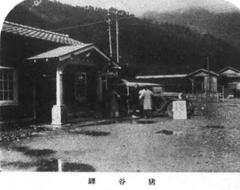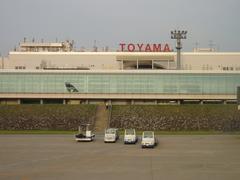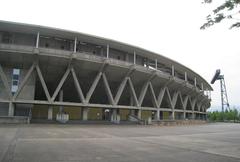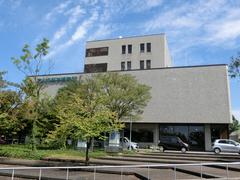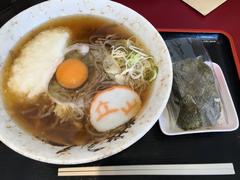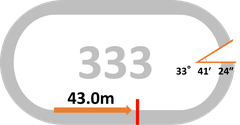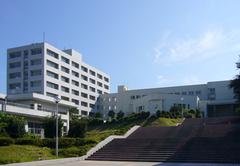Toyama City Sato Memorial Art Museum: Visiting Hours, Tickets, and Complete Visitor Guide
Date: 04/07/2025
Introduction
Located in the heart of the scenic Toyama Castle Park, the Toyama City Sato Memorial Art Museum stands as a prominent institution celebrating East Asian art and the cultural history of Toyama City, Japan. Founded in 1961 by Dr. Sato Sukekuro—a respected physician and art collector—the museum was established to preserve and share his extensive collection, which includes Japanese and East Asian paintings, calligraphy, ceramics, and implements used in the tea ceremony. The museum’s authentic tea rooms, traditional architecture, and seasonal events offer visitors an immersive encounter with Japanese culture, set against the tranquil backdrop of castle ruins and manicured gardens (Toyama City Official Tourism Guide, Fun Japan: Toyama Castle Park, Japan Guide).
This comprehensive guide provides detailed information on the museum’s history, cultural significance, collections, visiting hours, ticketing, accessibility, travel tips, and nearby attractions—ensuring an enriching and well-prepared visit for art lovers, history enthusiasts, and travelers alike.
Table of Contents
- Introduction
- History and Cultural Context
- Museum Architecture and Facilities
- Collection Highlights
- Special Exhibitions and Tea Ceremony Experiences
- Visitor Information: Hours, Tickets, and Access
- Travel Tips and Nearby Attractions
- Frequently Asked Questions (FAQ)
- Visuals and Media Recommendations
- Summary and Final Tips
- Sources and Further Reading
History and Cultural Context
Origins and Founding
The Toyama City Sato Memorial Art Museum was founded in 1961 through the endowment of Dr. Sato Sukekuro, whose passion for East Asian art led him to assemble a remarkable collection of paintings, calligraphy, ceramics, and tea ceremony utensils. Dr. Sato’s vision was to create a public institution that preserved these treasures and fostered cultural appreciation in Toyama and beyond (Toyama City Official Tourism Guide).
Relationship to Toyama Castle Park
Set within Toyama Castle Park—an area steeped in history dating back to 1543—the museum benefits from a location that seamlessly connects Toyama’s feudal past with its modern cultural landscape. The park, with its remnants of the original castle, gardens, and cherry trees, provides a peaceful yet historically rich environment for museum-goers (Fun Japan: Toyama Castle Park).
Significance in Regional Heritage
The museum plays a crucial role in preserving the Hokuriku region’s unique cultural identity, offering exhibitions that highlight local artists, traditional crafts, and the evolution of East Asian aesthetics. Its educational programs, lectures, and workshops make it a hub for community engagement and cultural continuity.
Museum Architecture and Facilities
The museum complex blends traditional Japanese architectural features—such as white plaster walls, tiled roofs, and tatami-mat interiors—with modern amenities. Notable components include:
- Historic Tea Rooms: The authentic teahouses, Jōan and Ryūteian, were relocated from significant sites and are used for tea ceremonies and cultural demonstrations.
- Hinoki Hall: A Taisho-era structure made of Japanese cypress, relocated from the Sato family residence, serves as a venue for exhibitions and cultural events.
- Strolling Garden: The surrounding kaiyu-shiki (strolling) garden features a pond, stone lanterns, and seasonal blooms, offering a serene setting and beautiful photo opportunities (Visit Toyama Japan).
The museum is fully accessible, with ramps, elevators, and multilingual materials for international visitors.
Collection Highlights
The museum’s core collection comprises more than 1,300 items, including:
- East Asian Paintings: Japanese and Chinese hanging scrolls, folding screens, and ink paintings, some dating to the Muromachi period (14th–16th centuries).
- Calligraphy: Works by celebrated Japanese and Chinese calligraphers, including Zen poems and inscriptions related to the tea ceremony.
- Ceramics and Pottery: Tea bowls, water jars, and other utensils from renowned kiln sites like Seto, Shigaraki, Karatsu, as well as Chinese and Korean ceramics reflecting the wabi-sabi aesthetic (Sugoii Japan).
- Tea Ceremony Implements: Chawan (tea bowls), chasen (whisks), chashaku (scoops), and natsume (caddies), some with historical inscriptions and provenance.
- Lacquerware and Decorative Arts: Trays, boxes, metalwork, cloisonné, and textiles showcasing intricate craftsmanship and aristocratic tastes (Toyama City Tourism Association).
Notable masterpieces regularly featured include Muromachi-period monochrome ink scrolls, Edo-period tea bowls, calligraphy by Zen monks, and prized Chinese celadon and porcelain.
Special Exhibitions and Tea Ceremony Experiences
Rotating Displays
To ensure the preservation of delicate works and to offer fresh experiences, the museum rotates its displays and organizes four major exhibitions annually. These may focus on themes such as seasonal changes, specific artists, or the art of the tea ceremony. Temporary exhibitions may include loans from other institutions or private collections, enhancing the diversity of art on view.
Tea Ceremony Room
A highlight of the visitor experience is the opportunity to participate in or observe a traditional Japanese tea ceremony in the authentic tea rooms. The ceremonies, requiring advance reservation and sometimes an additional fee, provide insight into the artistry and philosophy of Japanese hospitality.
Visitor Information: Hours, Tickets, and Access
Opening Hours
- Tuesday to Sunday: 9:00 AM – 5:00 PM (last admission at 4:30 PM)
- Closed: Mondays (or following day if Monday is a national holiday) and December 29 – January 4
Admission Fees
- Adults: 500 yen
- University and High School Students: 300 yen
- Junior High School Students and Younger: Free
- Groups (20+): Discounted rates available
Ticket prices may vary for special exhibitions; always check the museum website or local tourism offices for the latest information.
Location and Access
- Address: Toyama City Sato Memorial Art Museum, Toyama Castle Park, Toyama City, Toyama Prefecture
- From Toyama Station: 10–15 minutes on foot; accessible by Toyama City Tram Line (Toyama Castle Park stop)
- By Car: Limited parking nearby; public transportation is recommended during busy periods
Accessibility
- Wheelchair accessible (ramps, elevators, accessible restrooms)
- Multilingual printed guides and some English signage
- Staff assistance available upon request
Facilities
- Clean restrooms, lockers, and a gift shop with art-themed souvenirs
- Occasional tea ceremonies and workshops
- Café located nearby in Toyama Castle Park
Travel Tips and Nearby Attractions
- Best Visiting Seasons: Spring for cherry blossoms, autumn for foliage—both offer spectacular views in the park.
- Combine Your Visit: Explore Toyama Castle Keep, Toyama Municipal Folk Museum, and the Matsukawa River Cruise for a full day of cultural discovery.
- Dining and Accommodation: Numerous restaurants, cafes, hotels, and ryokan are within walking distance.
- Tourist Information: The Toyama City Tourist Information Center at Toyama Station provides maps and multilingual support.
Frequently Asked Questions (FAQ)
Q: What are the museum’s opening hours?
A: 9:00 AM–5:00 PM, Tuesday to Sunday; closed Mondays (or next day if a holiday) and December 29–January 4.
Q: How much is admission?
A: 500 yen (adults), 300 yen (students), children free. Group rates and special exhibition pricing may apply.
Q: Is the museum wheelchair accessible?
A: Yes. Ramps, elevators, and accessible restrooms are provided.
Q: Are tea ceremonies available?
A: Yes, in the authentic tea rooms; advance reservations and fees may apply.
Q: Can I take photos inside?
A: Photography is permitted in some areas. Restrictions apply for certain exhibits—please check signage or ask staff.
Q: Do I need to book tickets in advance?
A: Regular admission tickets are purchased on-site. Advance reservations are recommended for guided tours, tea ceremonies, and group visits.
Q: What language support is available?
A: Most information is in Japanese, with some English materials and guides available.
Visuals and Media Recommendations
- High-quality images of the museum’s architecture, gardens, and key exhibits can be found on official tourism websites.
- Virtual tours and maps are available on the Toyama City Official Tourism Guide.
- All images are described with alt text for accessibility, e.g., “Toyama City Sato Memorial Art Museum tea bowl,” “East Asian antique paintings at Toyama museum,” and “Museum exterior in Toyama Castle Park.”
Summary and Final Tips
The Toyama City Sato Memorial Art Museum stands out as a cultural gem, seamlessly blending historical architecture, curated art collections, and hands-on experiences such as tea ceremonies. Its location within Toyama Castle Park, proximity to other heritage sites, and commitment to accessibility make it an ideal destination for both casual and serious visitors. For the latest updates on visiting hours, exhibitions, and events, consult the official museum website or local tourism resources. To enhance your trip, consider downloading the Audiala app for additional insights and personalized recommendations (Toyama City Official Tourism Guide, Fun Japan, Japan Guide).
Sources and Further Reading
- Toyama City Official Tourism Guide
- Fun Japan: Toyama Castle Park
- Japan Guide: Toyama City Sato Memorial Art Museum
- Visit Toyama Japan
- Sugoii Japan
- Toyama City Tourism Association
- ANA Japan Travel Planner
- WhichMuseum
- Toyama Prefecture Museums Official Site
- Japan Experience - Sato Memorial Art Museum
